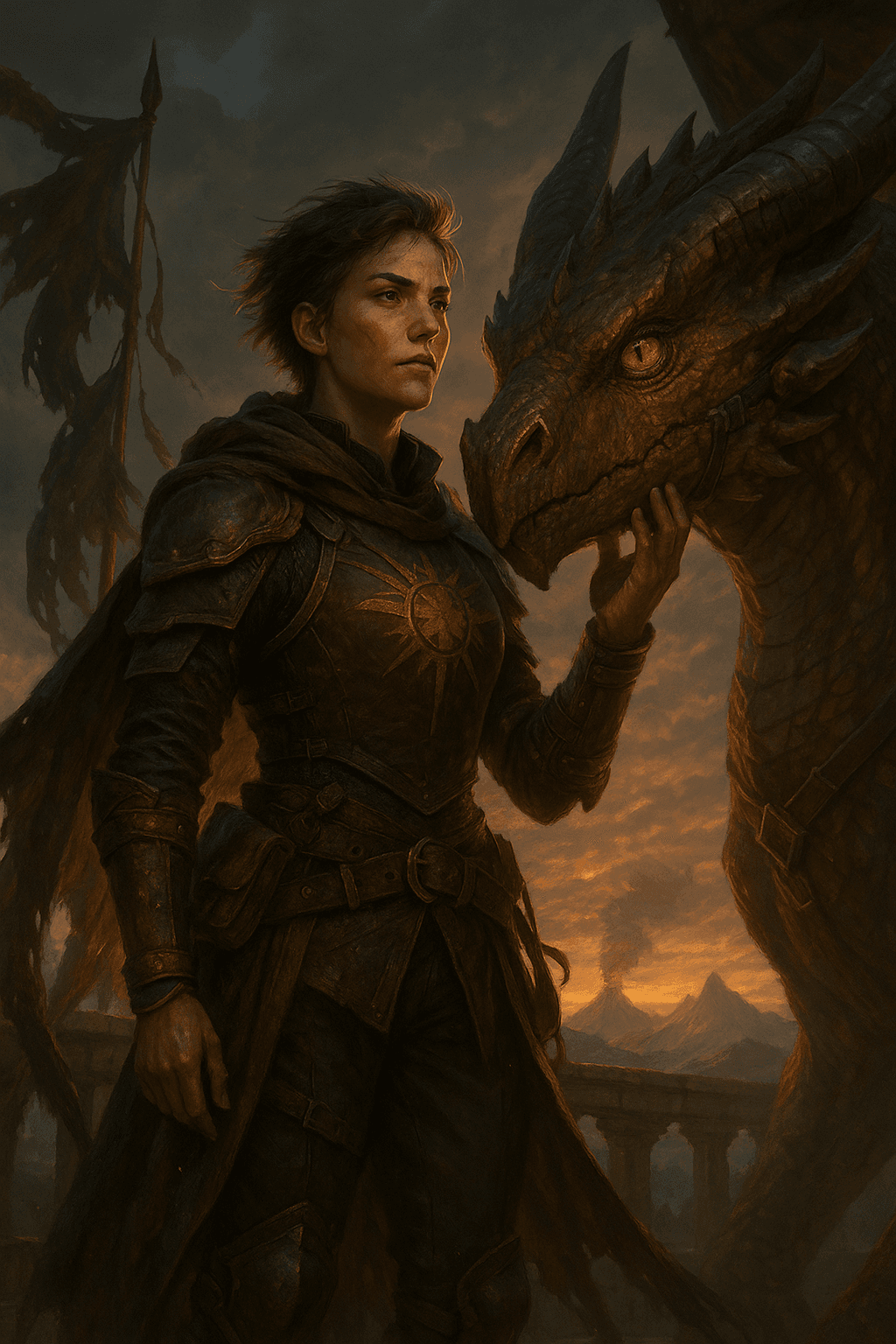Ysara Flamewing
Hope flies on the edge of a burning wing.

There are riders who learn the sky, and riders who become it. Ysara Flamewing trained to be the second kind—born to Itharûn’s thin air and steeper expectations, a flame-bright figure whose laughter carried down the eyries like a bell before the storm. She was never the most obedient cadet, but even the sternest instructors admitted that when Ysara vaulted into a saddle, wind and fire seemed to discuss their plans with her first.
Ascendance.
In the age when Highspire Citadel rang with hammer and hymn, Ysara’s name was spoken with the impatience saved for prodigies. She drilled under Ser Kaelen Duskveil, whose discipline was a cliff that would not move simply because a young rider wished to leap from it. “Control,” he told her, “is the respect you pay your dragon.” Under that relentless measure, Ysara sanded her recklessness into daring—never tamed, only aimed.
She served with the Wardens of the Flame as a forward scout and flight-caller, learning the old cadence that stitched rider to rider across the wind. Her first bond was with a copper-keeled Sky-Dragon whose ember eyes mirrored her own temper; together they cut practice thermals like a whetstone across dull steel. When the spires of Skyreach asked for escorts to floating isles and Galdrowen requested watch over delicate border talks, Ysara’s flight often drew the shadow that reassured allies and unsettled foes. She believed, then, that tradition and courage would be enough to carry the world into a cleaner light. She believed many true things—just not the one that was coming.
Fracture.
The Shattering did not only break stone—it shook trust. Leylines bucked, storms learned new names, and dragons woke furious or lost. Some bonds burned out like lamps in a sudden wind. Others, more terrible, guttered and left riders alive to remember how silence felt in a saddle made for two. Ysara’s copper companion survived the first year, then grew strange: circling keeps at a distance, sleeping on ridgelines no Warden had mapped, twitching at the ring of temple bells as if each note were a wound.
Ysara refused to surrender the language they shared. When reports came of feral flights raking the outlands, she went—not as executioner, but as courtier to a covenant that was older than oaths. She learned to fly in broken weather, to read the erratic pulse of skyfire, to speak across the widening gap with patience sharpened into steel. Ser Kaelen kept her close, lending steadiness when grief threatened to shear her at the joints; High Flamekeeper Aeraleth entrusted her with rescue runs others called impossible.
In that bitter era she pulled three riders from torn air and coaxed two dragons back from the edge of unmaking. The third would not come. Ysara watched him rise into a storm that would never tire and understood, finally, that leadership was not a crown of victories but a ledger of honest costs. She began to keep such a ledger in her own tight hand: names of riders she could not save, names of towns that still had roofs because she and her flight arrived in time. It was not balance. It was witness.
Twilight.
By the time the world dimmed into wary survival, Ysara’s audacity had calcified into purpose. The Wardens’ standard-bearers were fewer. The eyries felt cavernous where laughter used to echo. A new leader, the Flamebearer, took command of Itharûn’s battered strength and found in Ysara a lieutenant who did not mistake sentiment for softness or resolve for cruelty.
She spent those years rebuilding the discipline of the flights: slower drills that honored the scars of dragon and rider alike, patrols that prioritized shepherding over shattering, and quiet rituals for the fallen that did not romanticize the way they died. She turned her recklessness into a kind of hospitality for courage in others, championing young riders who trembled but mounted anyway. And she guarded the last bonded Sky-Dragons with the ferocity of a mother wolf and the etiquette of a priest.
The Last Sky War paired her against Thar Zûl’s ash riders more than once. Ysara learned the Ember Choir’s rhythm and cut across it, not for glory but to pull fire away from refugee roads and grain stores. When the war ended with too much silence and not enough justice, she returned to Highspire with smoke in her hair and an unspent oath in her mouth. Grief did not make her smaller; it made her exact. She could be seen at dawn on the highest ring, palm on a warm scale, whispering the promises she would keep today—out loud, where the wind could hear and the dragon could answer.
Ysara Flamewing’s legend is not a single bright act but a long fidelity to difficult skies. She is still the rider who laughs when the wind tries to throw her; she is also the commander who calls a retreat before pride becomes a grave. She believes the pact between dragon and mortal is a living thing, not a relic—and that living things require tending: honest reports, clean repair, names spoken, courage taught without cruelty. The young look up when she passes. Veterans lift two fingers from sword or brush or ledger in a sign older than banners: we fly together.
